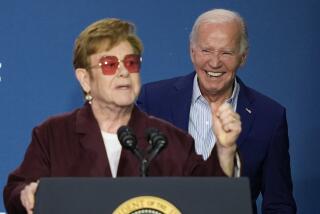Intent on Being in on the Outing
- Share via
BIRMINGHAM, Ala. — In bars and households from San Francisco to New York, lesbians and gay men cheered and applauded during the hourlong, historic episode of “Ellen” as the show’s lead character, portrayed by Ellen DeGeneres, came to the uncomfortable realization that she is gay.
And all over America, gays and lesbians marked the occasion with coming out parties of their own--the largest of which occurred, in all places, in this Bible Belt city.
The ABC affiliate here had decided that homosexuality was an “inappropriate” subject for family viewing and declined to air the episode--the sole station in the country to do so. The Gay and Lesbian Alliance Against Defamation responded by helping to arrange a gargantuan party in a city-owned auditorium. According to organizers, it was the largest gay and lesbian event ever in Alabama’s history.
“It was very empowering,” declared Stacy Brewer, a young lesbian who watched the satellite feed of the episode with 2,449 of her closest friends. “It presented a model that was accurately presented,” she said of the show. “A lot of times when the media portrays any homosexual it’s more of a side deal.”
Gays and their supporters--and a few stray souls who didn’t give a hoot about homosexuals but who just wanted to watch their favorite television show--payed $5 apiece and filled more than half of the auditorium’s bleacher-style seats and sat at large tables on the main floor of the giant hall.
They cheered wildly when Laura Dern, portraying a lesbian with whom Ellen is infatuated, invited the show’s star into her hotel room.
They shouted, “Say it!,” when Ellen got bollixed up trying to admit that she is gay.
They leaped to their feet and roared when she finally made the difficult admission.
And when a crew from the local television station that refused to air the episode showed up to tape some footage, a small but vocal segment of the audience tried to chase them away. “Why are you even here?” they demanded to know. “Go home!”
Then, after the show, the dance music and strobe lights came on. There were a few cross-dressers in outrageous dresses and Day-Glo wigs, but for the most part the crowd was a cross-section of gay middle America. A few even brought their kids.
Ellen’s coming out was not just an occasion for fun and games, though. Television, after all, is not only the most democratic of media; it arguably is the most influential. While many gays hailed the show as a cultural and symbolic breakthrough of historic proportions, their opponents view it as evidence of America’s moral decline.
The Rev. Jerry Falwell has lashed out at DeGeneres, calling her “Ellen DeGenerate.” And Lana Metcalf, spokeswoman for the Alabama Family Alliance, said she fears that gays will use the episode as a springboard for more explicit depictions of homosexuality. The show and the hype surrounding it probably were driven more by marketing concerns than by ideology, she said, but she fears it is another step in the normalizing of a lifestyle she considers destructive and immoral.
“Television and the other mass media have great impact on the culture,” she said. “We see the effects on children and families every day.”
Kevin Snow, a local gay comedian who came up with the idea of renting the auditorium, agreed with Metcalf on one point--television’s influence.
“More than any other medium, television has an opportunity to present us with a portrait of the American family as it really is, in all of its diversity,” he said, adding that accurate portrayals are important to self-esteem. “No longer will gays and lesbian families be cropped out of the picture.”
For all of the controversy caused by the station’s decision not to air the episode, there was little negative reaction to the renting of the city auditorium for the satellite feed--no protests, no loud outcry, no angry letters in the newspaper.
“We were disappointed,” said Rick Fennell, who came to the “Ellen” party with friends. “We thought there would be people carrying picket signs.”
To be sure, this is the Bible Belt, and there is a sizable segment of the populace who would rather the airwaves were free of sexuality of any stripe, and particularly homosexuality.
But they have been no more vociferous here than anywhere else. When WBMA decided not to carry the episode it was not because of community protest. “There really hasn’t been a lot of pressure either way,” Jerry Heilman, the station’s president and general manager, told the Birmingham News last month.
Heilman said the station simply had decided on its own that the show was not appropriate for family viewing.
He first tried to delay the episode until 11:30 p.m., “what we consider an adult time.” But the network would not allow him to do that. He said he will decide on a case-by-case basis whether to pull future “Ellen” episodes.
The audience Wednesday night was overwhelmingly gay, but not exclusively. Included in the crowd were Stephen and Julie Steward, a straight couple who don’t even watch “Ellen” normally. An English teacher at a Southern Baptist college, Julie Steward said she could be fired if her bosses knew she attended, but she wanted to support the issues of free speech and gay rights--”the last civil rights struggle,” she called it.
Noting that Birmingham was the site of numerous civil rights marches and racial confrontations in the 1960s, she said it was only fitting that gays and their straight supporters take a stand here on the issue. In her view, the episode exhibited Christian values in Ellen’s friends’ acceptance of who she is.
Not everyone present saw the broadcast in such grandiose terms. “I just think of it as entertainment,” Fennell said. He acknowledged, though, that as a gay man, he thought the episode dealt sensitively and accurately with issues that confront all homosexuals as they face the reality of their sexual orientation and share their secret with friends and family members.
As one gay minister said from the stage just before the start of the show, “Families don’t need to be protected from us--there’s an Ellen in every family.”
More to Read
The complete guide to home viewing
Get Screen Gab for everything about the TV shows and streaming movies everyone’s talking about.
You may occasionally receive promotional content from the Los Angeles Times.






